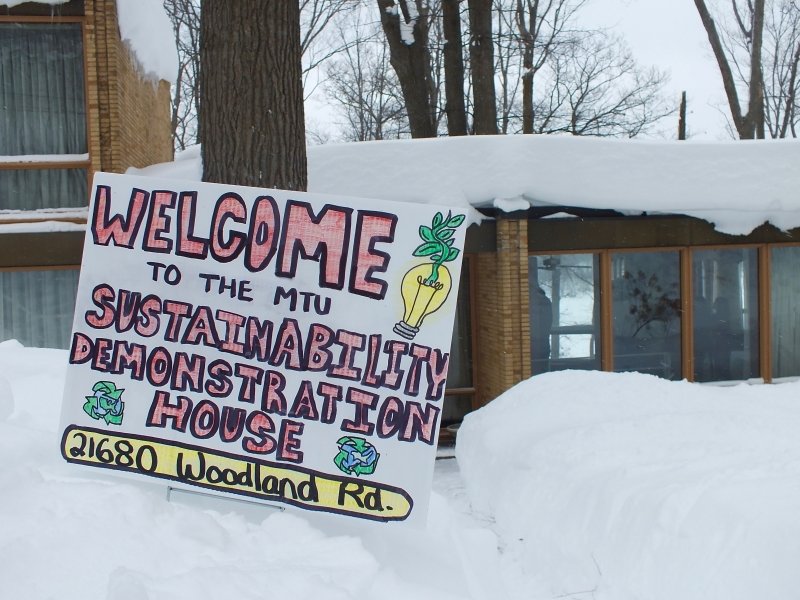
Richelle Winkler shares her knowledge on Husky Bites, a free, interactive webinar this Monday, November 1 at 6 pm ET. Learn something new in just 20 minutes (or so), with time after for Q&A! Get the full scoop and register at mtu.edu/huskybites.
What are you doing for supper this Monday night 11/1 at 6 pm ET? Grab a bite on Zoom with Dean Janet Callahan and Richelle Winkler, professor of Sociology and Demography—and advisor to students living in Michigan Tech’s Sustainability Demonstration House (SDH for short). “I took over as faculty advisor for the SDH just this fall,” she says. “I worked with Jay Meldrum (then executive director of sustainability at Michigan Tech) to start the House back in 2016 and 2017. I’m excited now to be more involved.”
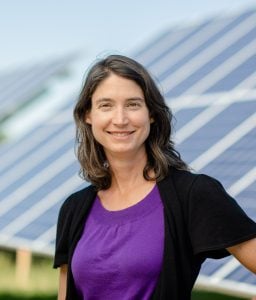
Michigan Tech’s Sustainability Demonstration House is a residential learning environment where students test and practice sustainability in their daily lives. The SDH began in 2016 as a project by the student-run Alternative Energy Enterprise, with the goal of retrofitting the Kettle Gundlach house, a three-floor abode, built in 1953 by Herman “Winks” Gundlach (and a former residence for past presidents of Michigan Tech) into a net-zero energy, zero-waste house.
In 2017 Michigan Tech students took residence and started retrofitting the three-floor abode to make it more sustainable. The SDH mission is to constantly innovate and design new additions that reduce the environmental impact of the house while also educating the MTU campus and larger community on sustainability.
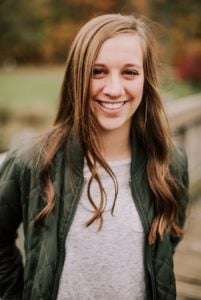
During Husky Bites, two current residents will take us on a tour of the house. Abbey Herndon ‘23, a sustainable bioproducts major and SDH coordinator, and Kendra Lachcik ’23, an environmental engineering major and SDH resident—will share improvements they’ve made, how living in the SDH impacts their lives, and what they’ve found to be opportunities and challenges for reducing our residential environmental footprints.
That includes toothbrush recycling. Community outdoor yoga sessions. An annual Earth Day dinner. Vertical hydroponics. Volunteering at local farms. Bird window strike prevention. Practicing Eco Sabbaths—and much more.
Over the past four years the house has been equipped with a 8.6 kWh solar array, two composting systems, aquaponics, hydroponics, a rain barrel, energy-efficient appliances, low-flow faucets, LED lights, and a bee hive. In addition, the tenants of the house strive to educate the community on sustainability through open houses, workshops, tours, the Waste Reduction Drive, and many other initiatives.
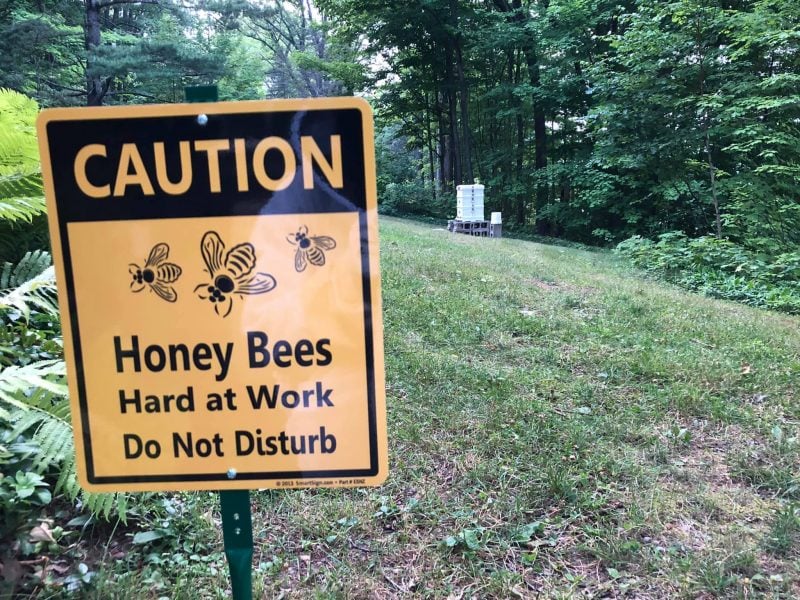
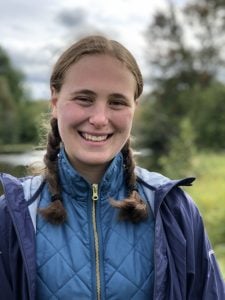
“I’ve been extremely passionate about environmental issues for a very long time,” says Lachcik. “I’ve been on a journey to reduce my environmental impact as much as possible, while encouraging those around me to do the same. The SDH has served as an amazing opportunity to do both of those things.”
When she’s not advising SDH, Prof. Winkler’s teaching and research include migration, community-engaged scholarship, and environmental sustainability.
“Most of my work here at Michigan Tech is guided by a concern about spatial inequalities—the fact that life and well-being is better in some places than others,” says Winkler. “I see these things as interrelated. Social and environmental well-being complement one another. Migration is both a cause and a consequence of socio-ecological well-being. People move toward places they see as good, or at least better than where they are coming from. So migration can serve as a sort of indicator of where things are going well. At the same time, both in-migration and out-migration can impact community development in positive and negative ways. It’s a circular pattern.”
Community-engaged research just puts the whole pattern into practice, says Winkler. “I really enjoy seeing how these things play out on the ground and working directly with community groups who are working to improve conditions.”

Prof. Winkler, When was the moment you knew sociology was the field for you?
When I went to college, I didn’t know what I wanted to do for my career. I was curious about just about everything. I took a sociology class and learned that it was possible to study just about anything from a sociological perspective. This meant I didn’t have to choose! I also wanted a career where I could help people and make a positive difference in the world, and it seemed to me then (and still) that sociology is a field where I could focus on that.
Hometown, family?
I grew up in Rush and Shelby counties in Indiana, between Indianapolis and Cincinnati. Most of my cousins, aunts and uncles still live in that area today, and it still feels like home. My immediate family and I (husband and two kids, ages 9 and 12) have lived in Houghton for over a decade now, and we love it here.
Any hobbies? What do you do in your spare time?
I love exploring natural areas across the Keweenaw and beyond, mostly hiking, visiting beaches and rock hunting, and mountain biking with my dog (Opal) and with family and friends. I also love sports, especially volleyball which I’ve played and coached for almost my entire life. I cheer on my alma mater (the Wisconsin Badgers!) and have grown pretty attached to the Packers, spending the last twenty years in Wisconsin and the UP.
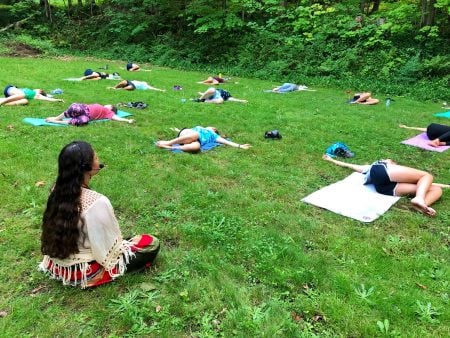
Abbey, how did you first get into sustainability? What sparked your interest?
My family has a few engineers. Growing up they told me I always had a problem-solving mindset and I enjoyed engineering topics so I pursued it. However, during my second year studying engineering I switched to Sustainable Bioproducts. This course of study strongly fits my career goals. So far, I have thoroughly enjoyed my new path and am excited for what I will be able to do with it.
Hometown, family?
I grew up in Appleton, Wisconsin with one older brother. I’ve always had a small family, which I enjoy because I get to see everyone often.
What do you like to do in your spare time?
I enjoy traveling, trying new things, and various forms of creating art. In my free time I like to be outdoors getting exercise. I’ve also got four cats and a pug named Dave.

Kendra, how did you first get into engineering? What sparked your interest?
I’m a very hands-on person and science has always been my favorite school subject, so engineering seemed like a natural fit. In high school, I participated in a program called “Science Olympiad.” Two of my favorite events involved constructing a wind turbine and building a Rube Goldberg machine. Engineering is all about applying science and technology to the real world, which I think is pretty darn cool.
Hometown, family? Hobbies?
I’m originally from Chicago, IL and have two younger brothers. I’m into figure skating, dancing, running, exploring places, cooking vegan food, and doing all those things with lovely people.
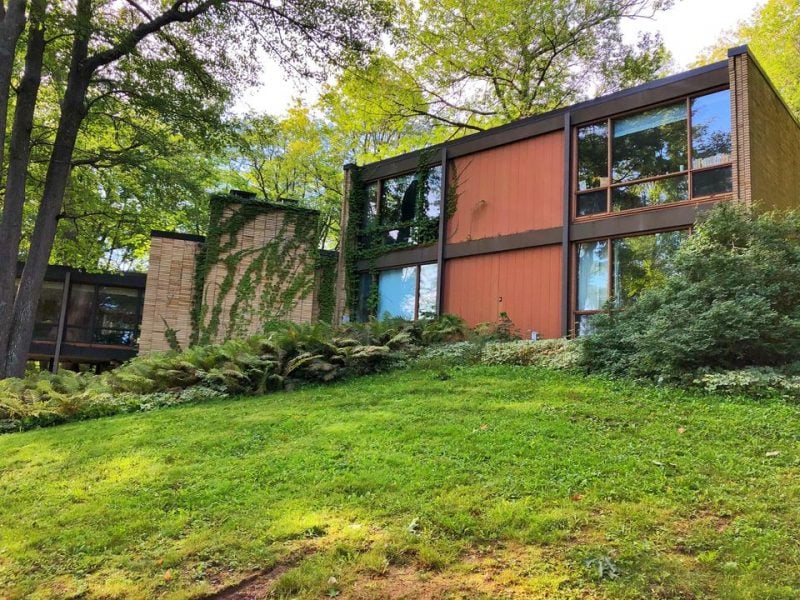
Read more:
This Old House Teaches U.P. Residents, and an Appliance Manufacturer, New TricksMaking it Personal: Richelle Winkler Wins Distinguished Teaching Award